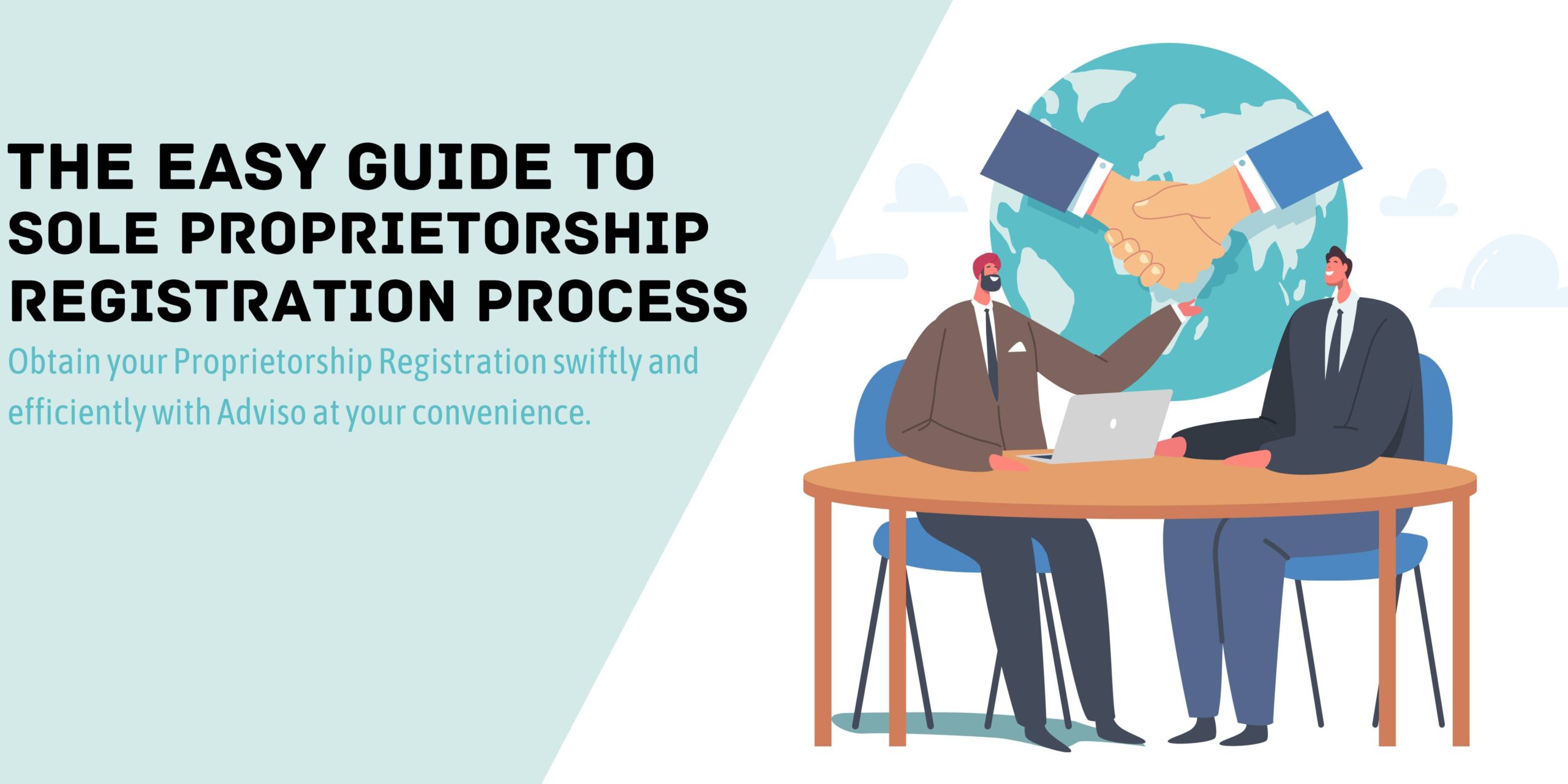Introduction of Sole Proprietorship Registration Process
Sole proprietorship, being one of the simplest and widely used types of business in India, is among the broadly used forms of business in the country. It is a form of ownership structure wherein an individual directly participates in the business and operates the business in his or her name. Business and the owner/proprietor are the same in terms.
It is only mandatory for a business to obtain the certificate of registration and certificate of incorporation which is not mandated. However, most entrepreneurs in India use sole proprietorship to avoid the complex requirements of the registration process and to make the registration process as simple as possible. Nevertheless, specific registrations and licenses might be needed by the business depending on its activities. Whether it is the Shop and Establishment registration for the sole proprietor or the GST registration, there are several registrations which are vital to commence the business operation.
Due to the state laws a business must register itself within a specified time of establishment of trade. In Sole Proprietorship Registration Process this is a mandatory step and thus cannot be avoided. As well as a business entity registration, while the kind of business determines it, further registrations may boil down to the GST, Professional Tax, Import Export Code, and so on.
Requirements in Sole Proprietorship Registration Process
Registration for Sole Proprietorship Registration in India is comparatively easier than the other forms of business. Here are the essential details regarding the requirements:
- Shop and Establishment Registration: This documentation is to be done in respective States under the law they govern within the overall timeframe from the inception of the business. This does come from the business council or the Municipal Corporation (council) and it confirms the organization.
- Goods and Services Tax (GST) Registration: To be more specific, if the turnover of the business goes over the registration threshold, GST registration may be mandatorily required.
- Professional Tax Registration: Such kinds of state dependability might also be required, to a larger extent care for service-based firms. Professional tax should be paid to the state government department, according to the state law.
- Licenses and Permits: Specific cases might entail licenses or permits such as food safety and standardization health authority licenses for food ventures, import-export codes for businesses in international trading, and so on.
- Bank Account: It must be pointed out that a distinct bank account is to be opened under the name of the sole proprietor company. Thus, such profit records are properly maintained and personal and business transactions are differentiated.
- PAN/TAN Registration: Any single owner must register a PAN Card with the Income Tax Department. PAN is a crucial document used for undertaking both monetary transactions and filing tax returns which is then followed by paying income tax. Employee taxes are another point where TAN registration does come in handy as it makes it possible to deduct and subtract these from employees’ pay.
- Intellectual Property Protection: What the sole proprietor may focus on are the intellectual aspects which are centred around branding, originality or creativity. It is recommended the sole proprietor applies intellectual property protection. Besides trademarks, copyrights, and patent applications, this may protect the business’s resources.
- Compliance with Labor Laws: Regarding the term of the sole proprietorship and making oneself through the system of labour laws and employment regulations.
Advantages of Sole Proprietorship Registration Process
Registration of sole proprietorship in India has several benefits. Here are the key benefits of the sole proprietorship registration process:
- Easy and Cost-Effective: To register a sole proprietorship one just needs to have minimal effort and budget in comparison to the other types of business legal personalities.
- Direct Control and Decision-Making: You as a sole trader own all the powers of making decisions about the whole. You are rid of bureaucracy hence you can act according to your mission, objectives, and vision on an immediate basis without waiting for consultations or approvals from other managers.
- Flexibility: Sole proprietorships, in terms of business operations, offer flexibility that enables entrepreneurs to structure the business as they deem fit.
- Minimal Compliance Requirements: About other company types, sole proprietorships have those compliance requirements.
- Tax Advantages: The sole proprietors are subjected to individual income tax rates often which are the most advantageous tax rates among diverse forms of business taxing.
Documents Required for Sole Proprietorship Registration Process
The documents needed for the entry of the sole proprietorship to be registered in India can differ not just based on the nature of the business but also at the jurisdiction level. However, here are some common documents that are usually needed:
- Identity proof of the proprietor: Aadhaar authorization, Permanent Account Number Card, or passport
- Address proof of the proprietor
- Passport photos of the business owner.
- Proof of business address: Lease agreement, assets receipt or proof of property ownership, etc.
- The personal account statement of the sole proprietor.
- Trade license/business license (if any).
- GST registration certificate (If your business is eligible for GST registration).
- Professional Tax Identification Number (TIN) certificate (if applicable)
- Import-Export Code (IEC Certificate) number
- The owner, as well as NOC (No Objection Certificate), is required from the owner (if the property is rented)
- Partnership Agreement or other required agreement template (if applicable).
- The licensing and the permits that are particular to your business category, for instance, the license from the authority that regulates food (FSSAI), pollution permit etc. (if applicable)
- Attachment and Memorandum and Articles of Association (in the process of changing an operating business to a sole trader)
Procedure for Sole Proprietorship Registration Process
The Indian government has made procedures facilitating for registration of sole proprietorship firms. There is no single law that governs the registration of sole proprietorship. However, some procedures need to be followed to be compliant and formalize the business. Here is a general overview of the procedure:
- Business Name: Choose the name for your sole trade that is catchy, appealing and it fits your business description well.
- Collect Documents: Obtain every essential document i.e. identity proof, address proof, photographs of the manager, proof of business address, registers, license, and bank statements etc.
- Shop and Establishment Registration: You will need to go about and get registered for your Shop and Establishment Registration from the local municipal corporation or council within the due time as commencing the business.
- Optional Registrations: Considering your business nature register for other registrations such as GST registration, professional tax registration, import–export code, etc. as required in your country.
- Prepare Documents: Obtain the needed documents, such as the entrepreneurship deed, the partnership deed (if applicable), affidavit, etc., including the specific requisites of the jurisdiction.
- Obtain Certificates and Licenses: Officials will verify and process the documents on which the relevant registration certificates include, the shop and establishment certificate, GST certificate, tax certificate, and so on.
- Open Bank Account: Open a bank account where you would put your sole proprietorship business name and this should be different from your accounts.
Conclusion
To registration, Indian sole proprietorship is a lot easier to deal with contrary to other business structures. Just like the sole proprietorship, there is no specific law regulating its registration but the owners need to fulfil some registrations, licensing and allegiance to the law depending on what his/her business deals with and what the jurisdiction requires.
The sole proprietorship registration procedure entails completing the actions like selection of a distinctive and exclusive title, submitting all the needed documents, getting the Shop and Establishment Registration, and extending the registration, maybe general sales tax (GST) for additional benefit. Aside from these, among the main documents required, appropriate permits, visits to the government offices and opening another bank account for the business are the most crucial matters. Sole proprietors who completed the registration process can take advantage of these benefits; they are inclusive of being the sole decision maker in the business continuance and operations, flexibility and lower compliance demands for business activities, tax-evasion benefits, and confidentiality in the business operation.
On the other hand, the drawbacks of running a business independently should also be borne in mind, which are a single person’s liability without limits and limited as a matter of principle access to money. To make registering as simple and legally flawless as possible, it is smart to get legal advice from a counsellor or an expert trained to deal with laws and regulations in your area. This will help businesses sail through the process in an easy manner armed with the required entrepreneurial spirit for a successful entrepreneurship in India.




